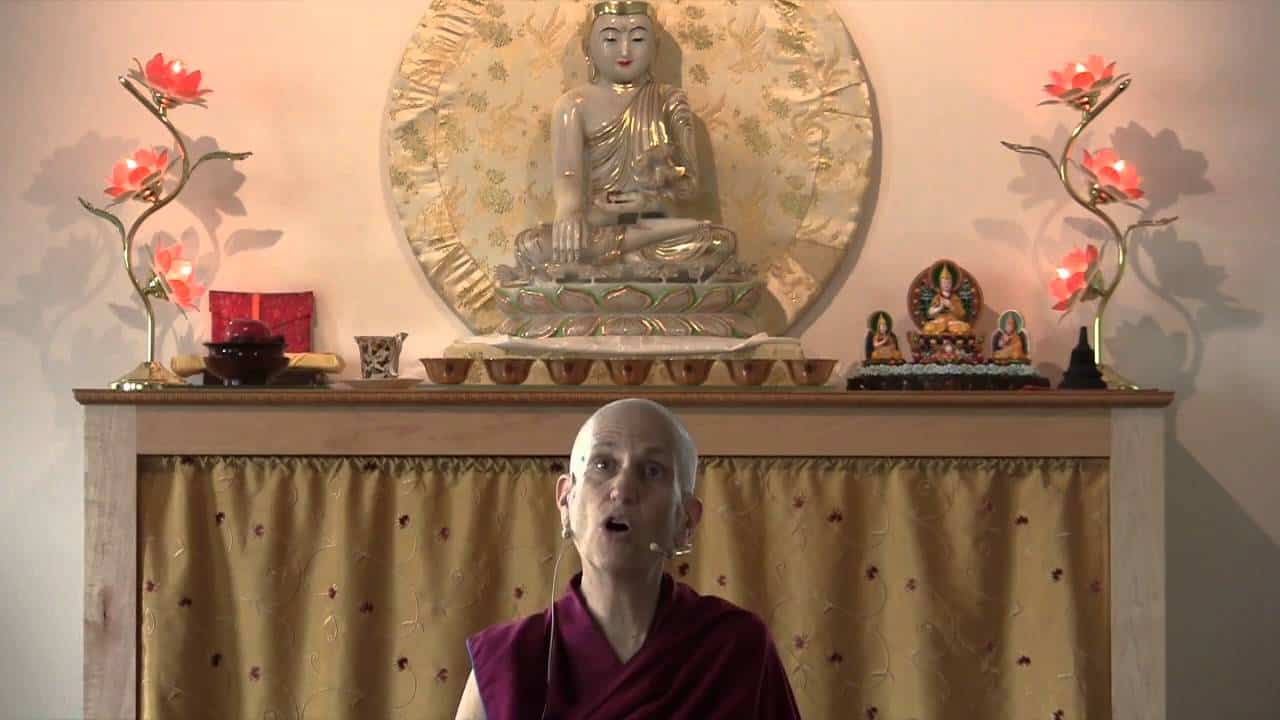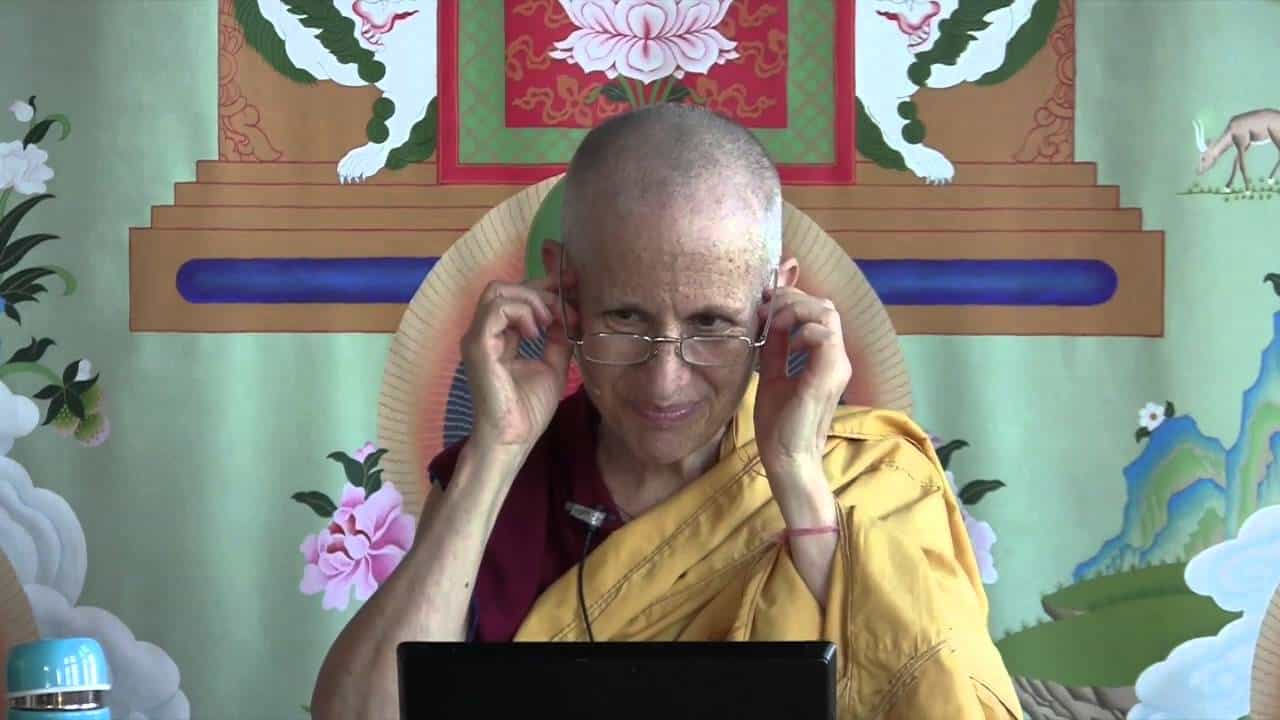Changing relationships
Part of a series of teachings on a set of verses from the text Wisdom of the Kadam Masters.
- Looking at equalizing ourselves and others from the ultimate level
- Changing relationships between friends, enemies, and strangers
- Relationships don’t end, they just change
- How “self” and “other” is merely imputed, and relative
Wisdom of the Kadam Masters: (download)
We’ve been talking about the method for equalizing self and others which is part of the bigger meditation of equalizing and exchanging self and others. We’ve talked about six of the nine points so far. Those six points have all been looking on the conventional level of things. The last three points have to do with the ultimate level. Why there’s no difference between friends, enemies, strangers, and ourselves and others.
First of all, the relationships change all the time. This is more in terms of friends, enemies, and strangers. They can’t be truly existent friends or enemies or strangers because the relationships change. If things were truly existent then whatever category somebody was first in they would always be in that and they would never change.
You can see this is a problem with our mind because as soon as we put somebody in one category we make them permanent, and that’s why we often have so many problems when our ideas about somebody change, or our relationship with them changes.
Here let me just diverge for a minute, because I hear people sometimes talk about “I’m ending the relationship. We’ve been in a relationship and I’m ending the relationship.” I thought about that for a long time, and we never end relationships. We only change relationships. We have a relationship with every single sentient being in the whole universe, even though we don’t know them in this life, even though we don’t see them in this life, we still exist interdependent with them, in relationship with them. So, saying, “I’m ending the relationship” makes it sound like you never have any relationship ever, ever, ever, EVER again, but that’s impossible because even you go to a mountain you’re still surrounded by sentient beings. We just change relationships. Maybe people go more into the stranger category for a while. But we never end them. Are you getting what I mean?
If we understand that then it helps us not get stuck in really negative emotions about somebody. “I’m ending the relationship, I never care about them again!” First of all, if you think like that you’ve lost your bodhicitta, which is big problem. But also it’s completely wrong. We just change, closeness, distance, whatever it is. Everybody’s been our parent, so….
So, the fact of the changing relationships. Let’s not make them too concrete.
Then second, if self and others were truly existent the Buddha would see them that way. But the Buddha doesn’t. And if we were the most important one in the universe the Buddha would see that. And the Buddha doesn’t. I know sentient beings are stupid because they don’t see that, but can we say the Buddha is, because he doesn’t realize we’re the center of the universe? That one’s not going to work, is it? We can’t say that self and others are that distinct, I’m the most important one, if the Buddha, who is omniscient and knows everything directly, both in its conventional status and its ultimate mode, doesn’t see that. We have to revise our idea.
And then the third one (I love this one, this one really hits me) is that the designation self and others is merely imputed, dependently imputed, like “this side of the valley” and “that side of the valley.” When you’re here, this is this side of the valley and that’s [pointing] that side of the valley. When you’re over there [pointing] “this side of the valley” is there. The other side of the valley is here. Here and there got changed around. That’s the whole point. Here and there got changed around.
In the same way “self” and “others” depends on the perspective. In relationship to you, I’m self and you’re other. But from your perspective you’re “I” and I’m “other.”
I remember when Serkong Rinpoche was teaching this and Alex was translating it and Rinpoche was going back and forth between “you are I and I’m you,” and Alex got so tangled up in the translation, and Rinpoche said, “So you don’t know if you’re ‘I’ or ‘other,’ do you?” [laughter] “You don’t know if you’re “I” or you or you or me or who you are anymore.” And that’s the whole point. As soon as we give the word “I” there’s such baggage that comes with it, and it’s only because of the designation “I” which happens to be given from the perspective of one sentient being. Only one is giving that label. Then from the perspective of everybody else “I” is you out there. It’s a validly labeled “I” or a validly designated “I.” I can’t say that I’m the truly existent “I” and you’re truly existent “other” and therefore less important, because from your perspective “I” is labeled in dependence on your body and mind and other is labeled in dependence on this body and mind. If you really contemplate it for a long time “I” and “you” really become just that, they’re just designations, they’re just terms and concepts and there’s nothing there to back it up. This is very forceful when you really think deeply about it. In that way, then, we should equalize self and others. Even though we still think at the bottom we’re more important, which is why the next step is the disadvantages of self-centeredness, but we’ll get to that next time. Shantideva doesn’t let up on us
.
Venerable Thubten Chodron
Venerable Chodron emphasizes the practical application of Buddha’s teachings in our daily lives and is especially skilled at explaining them in ways easily understood and practiced by Westerners. She is well known for her warm, humorous, and lucid teachings. She was ordained as a Buddhist nun in 1977 by Kyabje Ling Rinpoche in Dharamsala, India, and in 1986 she received bhikshuni (full) ordination in Taiwan. Read her full bio.


